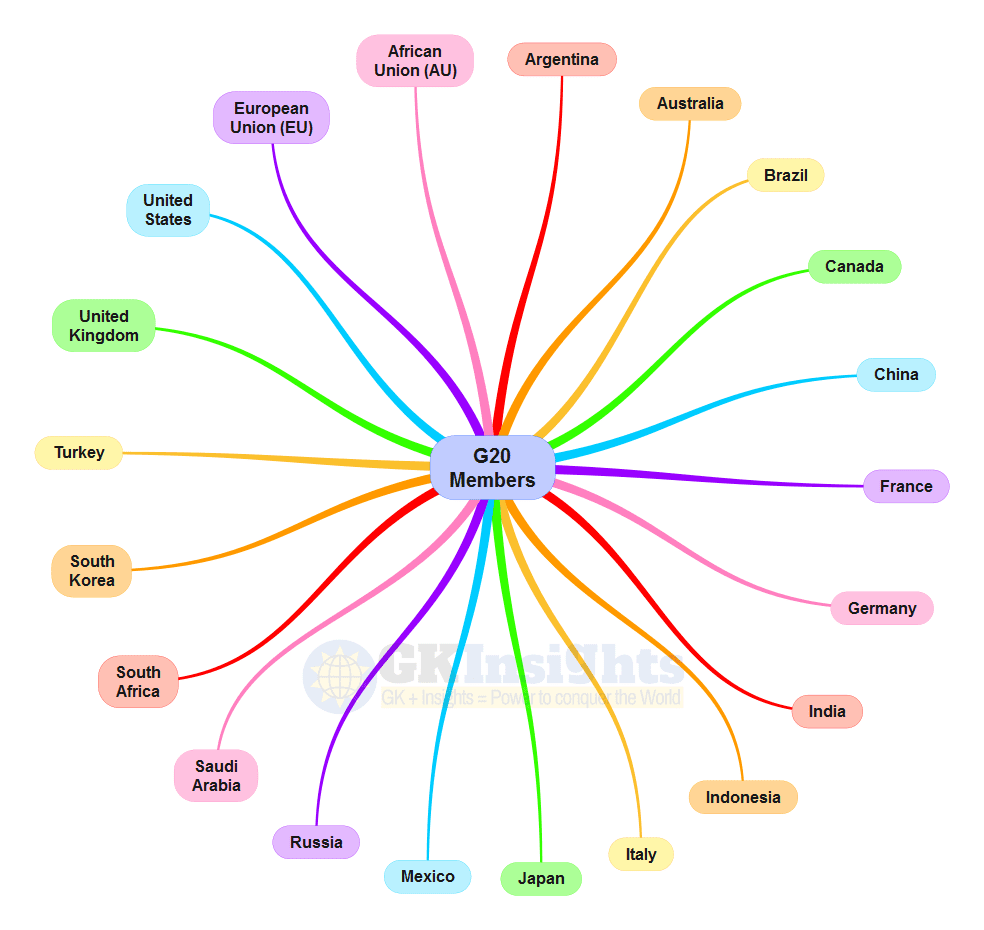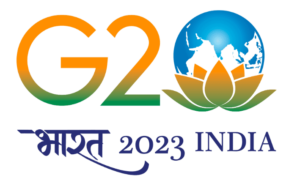G20 is an intergovernmental forum of 19 countries plus the European Union (EU) and the African Union (AU): Argentina, Australia, Brazil, Canada, China, France, Germany, India, Indonesia, Italy, Japan, Mexico, Russia, Saudi Arabia, South Africa, South Korea, Turkey, UK, US; + EU + AU

- Addresses issues related to the international financial system
- Collectively represent 80% of global economic output, 75% of trade, two-thirds of world population
- Originated in 1999 after Asian financial crisis
- First summit in 2008 in Washington DC in response to global financial crisis
Structure
- Leadership: Rotating presidency each year from different member country.
- Presidencies:
- 2022 – Indonesia
- 2023 – India
- 2024 – Brazil
- Presidencies:
- Summit: Annual summit hosted by presidency country attended by leaders.
- Tracks: G20 summit typically has two main tracks:
- Finance Track:
- Led by finance ministers and central bank governors
- Focus on economic and financial issues like fiscal policy, exchange rates, international tax, financial regulation etc.
- Finance ministers and central bank governors meet regularly through the year
- Sherpa Track:
- Led by sherpas (representatives) of G20 leaders
- Discuss broader issues beyond just finance like development, climate change, health, digital economy etc.
- Sherpas engage in negotiations and build consensus on non-financial issues
- Determines content of joint declarations and action plans
- Interacts with various engagement groups
- Finance Track:
- Ministerials: Meetings of finance ministers and central bank governors
- Engagement Groups: Outreach to civil society like think tanks, youth, women, business, science etc.
- Working Groups: Focus on specific issues like development, employment, digital economy, climate change etc.
- Logistics: Host country handles logistics of summit and events. Supported by “troika” of previous, current and next host countries.
- Commitments: G20 makes collective commitments through joint declarations at summits. Not legally binding but carry political weight.
Shortcomings of G20:
- Limited Inclusivity: G20 xcludes some countries, reducing global representation.
- Sluggish Decision-Making: The consensus-driven process can be slow
- Non-Binding Agreements: G20 decisions are often non-binding
- Scope Constraints: Focus on economic matters limits ability to address global issues
- Political Divergence: Differing political ideologies among members can hinder policy adoption
India’s G20 Presidency & Logo
- In 2023, India is holding the rotating leadership position of the G20 Presidency. India holds the Presidency of the G20 from 1 December 2022 to 30 November 2023.
- This presidency marks a significant milestone in India’s rise as a global. Many related events organised in India in 2023.
Theme
- Theme: “Vasudhaiva Kutumbakam“
- Meaning: Translates to “One Earth · One Family · One Future” in Sanskrit.
- Origin: Derived from the ancient Sanskrit text, the Maha Upanishad.
- Core Values: Affirms the value of all life forms and their interconnectedness on Earth and the wider universe.
- Sub-theme: LiFE (Lifestyle for Environment), focusing on environmentally sustainable choices at individual and national levels.
Logo

- Inspiration: Colors of India’s national flag – saffron, white, green, and blue.
- Elements: Planet Earth juxtaposed with the lotus, India’s national flower. “Bharat” written below the logo in Devanagari script.
- Message: Reflects India’s pro-planet approach and harmony with nature. [Logo Credits: g20.org].
Key Focus Areas
- Climate Change: Committed to clean energy, reducing emissions, and building climate resilience.
- Global Health: Advocate for global health, Focus on vaccine access, COVID-19 response.
- Digital Transformation: Promoting cybersecurity and protection against online threats.
- International Trade: Committed to free and fair trade, Addressing challenges of protectionism and unilateralism.
Additional Focus Areas
- African Union Inclusion: Inclusion of African Union countries in the G20.
- Guest Countries Invited: Bangladesh, Egypt, Mauritius, Netherlands, Nigeria, Oman, Singapore, Spain, and the UAE.
- Infrastructure: Improvement of roads, railways, airports, and ports.
- Food Security: Ensuring food security domestically and globally.
- Gender Equality: Promoting the empowerment of women and girls.
- Sustainable Development: Committed to achieving the Sustainable Development Goals.
These points would be helpful for UPSC Prelims as well as Mains. G20 is considered to be one of the major topics this year for UPSC exam.
Also Check:
– International Organisations & Groupings
– Ministries and Departments in India
